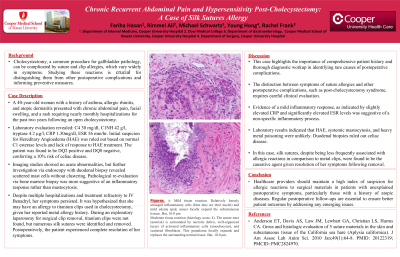Monday Poster Session
Category: Biliary/Pancreas
P1880 - Chronic Recurrent Abdominal Pain and Hypersensitivity Post-Cholecystectomy: A Case of Silk Sutures Allergy
Monday, October 28, 2024
10:30 AM - 4:00 PM ET
Location: Exhibit Hall E

Has Audio

Rimmel Ali, MBBS
Dow Medical College, MA
Presenting Author(s)
Fariha Hasan, MD1, Rimmel Ali, MBBS2, Michael Schwartz, MD3, Young Ki Hong, MD, MPH3, Rachel Frank, MD4
1Cooper University Hospital, Philadelphia, PA; 2Dow Medical College, Karachi, Sindh, Pakistan; 3Cooper University Hospital, Camden, NJ; 4Cooper University Hospital, Mt. Laurel, NJ
Introduction: Cholecystectomy, a common procedure for gallbladder pathology, can be complicated by suture and clip allergies, which vary widely in symptoms. Studying these reactions is crucial for distinguishing them from other postoperative complications and informing preventive measures.
Case Description/Methods: A 40-year-old female with a history of asthma, allergic rhinitis, and atopic dermatitis presented with chronic abdominal pain, facial swelling, and a rash requiring monthly hospitalizations for the past two years following an open cholecystectomy. Laboratory evaluation revealed: C4 30 mg/dl, C1NH 42 g/l, tryptase 4.2 µg/l, CRP 1.30mg/dl, ESR 56 mm/hr. Initial suspicion for Hereditary Angioedema (HAE) was ruled out based on normal C1 esterase levels and lack of response to supplemental C1. The patient was found to be DQ2 positive and DQ8 negative, conferring a 10% risk of celiac disease. Imaging studies showed no acute abnormalities, but further investigation via endoscopy with duodenal biopsy revealed scattered mast cells without clustering. Pathological re-evaluation via bone marrow biopsy suggested an inflammatory response rather than mastocytosis. Despite multiple hospitalizations and treatment refractory to IV Benadryl, her symptoms persisted. It was hypothesized that she may have an allergy to titanium clips used in cholecystectomy, given her reported metal allergy history. During an exploratory laparotomy for surgical clip removal, titanium clips were not found, but numerous silk sutures were identified and removed. Postoperatively, the patient experienced complete resolution of her symptoms and has not required further hospitalization.
Discussion: This case highlights the importance of a thorough diagnostic workup in identifying rare causes of postoperative complications. The distinction between symptoms of suture allergies and other postoperative complications, such as post-cholecystectomy syndrome, requires careful evaluation. Laboratory results indicated that HAE, systemic mastocytosis, and heavy metal poisoning were unlikely. Duodenal biopsies ruled out celiac disease. In this case, silk sutures, despite being less frequently associated with allergic reactions compared to metal clips, were found to be the causative agent given resolution of her symptoms following removal. Healthcare providers should maintain a high index of suspicion for allergic reactions to surgical materials in patients with unexplained postoperative symptoms, particularly those with a history of atopic diseases.
Disclosures:
Fariha Hasan, MD1, Rimmel Ali, MBBS2, Michael Schwartz, MD3, Young Ki Hong, MD, MPH3, Rachel Frank, MD4. P1880 - Chronic Recurrent Abdominal Pain and Hypersensitivity Post-Cholecystectomy: A Case of Silk Sutures Allergy, ACG 2024 Annual Scientific Meeting Abstracts. Philadelphia, PA: American College of Gastroenterology.
1Cooper University Hospital, Philadelphia, PA; 2Dow Medical College, Karachi, Sindh, Pakistan; 3Cooper University Hospital, Camden, NJ; 4Cooper University Hospital, Mt. Laurel, NJ
Introduction: Cholecystectomy, a common procedure for gallbladder pathology, can be complicated by suture and clip allergies, which vary widely in symptoms. Studying these reactions is crucial for distinguishing them from other postoperative complications and informing preventive measures.
Case Description/Methods: A 40-year-old female with a history of asthma, allergic rhinitis, and atopic dermatitis presented with chronic abdominal pain, facial swelling, and a rash requiring monthly hospitalizations for the past two years following an open cholecystectomy. Laboratory evaluation revealed: C4 30 mg/dl, C1NH 42 g/l, tryptase 4.2 µg/l, CRP 1.30mg/dl, ESR 56 mm/hr. Initial suspicion for Hereditary Angioedema (HAE) was ruled out based on normal C1 esterase levels and lack of response to supplemental C1. The patient was found to be DQ2 positive and DQ8 negative, conferring a 10% risk of celiac disease. Imaging studies showed no acute abnormalities, but further investigation via endoscopy with duodenal biopsy revealed scattered mast cells without clustering. Pathological re-evaluation via bone marrow biopsy suggested an inflammatory response rather than mastocytosis. Despite multiple hospitalizations and treatment refractory to IV Benadryl, her symptoms persisted. It was hypothesized that she may have an allergy to titanium clips used in cholecystectomy, given her reported metal allergy history. During an exploratory laparotomy for surgical clip removal, titanium clips were not found, but numerous silk sutures were identified and removed. Postoperatively, the patient experienced complete resolution of her symptoms and has not required further hospitalization.
Discussion: This case highlights the importance of a thorough diagnostic workup in identifying rare causes of postoperative complications. The distinction between symptoms of suture allergies and other postoperative complications, such as post-cholecystectomy syndrome, requires careful evaluation. Laboratory results indicated that HAE, systemic mastocytosis, and heavy metal poisoning were unlikely. Duodenal biopsies ruled out celiac disease. In this case, silk sutures, despite being less frequently associated with allergic reactions compared to metal clips, were found to be the causative agent given resolution of her symptoms following removal. Healthcare providers should maintain a high index of suspicion for allergic reactions to surgical materials in patients with unexplained postoperative symptoms, particularly those with a history of atopic diseases.
Disclosures:
Fariha Hasan indicated no relevant financial relationships.
Rimmel Ali indicated no relevant financial relationships.
Michael Schwartz indicated no relevant financial relationships.
Young Ki Hong indicated no relevant financial relationships.
Rachel Frank indicated no relevant financial relationships.
Fariha Hasan, MD1, Rimmel Ali, MBBS2, Michael Schwartz, MD3, Young Ki Hong, MD, MPH3, Rachel Frank, MD4. P1880 - Chronic Recurrent Abdominal Pain and Hypersensitivity Post-Cholecystectomy: A Case of Silk Sutures Allergy, ACG 2024 Annual Scientific Meeting Abstracts. Philadelphia, PA: American College of Gastroenterology.
